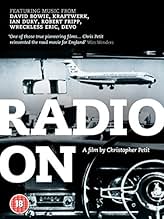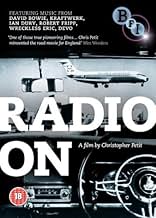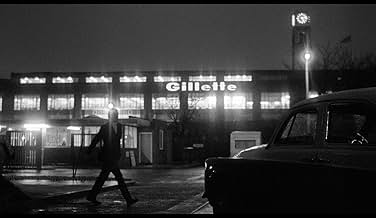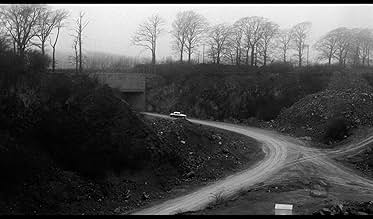Radio On
- 1979
- 1 h 44 min
AVALIAÇÃO DA IMDb
6,5/10
1,3 mil
SUA AVALIAÇÃO
Adicionar um enredo no seu idiomaIn 1970s Britain, a man drives from London to Bristol to investigate his brother's death, and the purpose of his trip is offset by his encounters with a series of odd people.In 1970s Britain, a man drives from London to Bristol to investigate his brother's death, and the purpose of his trip is offset by his encounters with a series of odd people.In 1970s Britain, a man drives from London to Bristol to investigate his brother's death, and the purpose of his trip is offset by his encounters with a series of odd people.
- Direção
- Roteiristas
- Artistas
- Prêmios
- 1 vitória e 1 indicação no total
Avaliações em destaque
As enigmatic as its title, Chris Petit's debut film is interesting visually, but less so in other respects, particularly narrative drive and character depth. To be perfectly honest, it starts slowly and decelerates from there, with David Beames' disillusioned disc-jockey setting out to ostensibly look into the death (in his own bath) of his brother. Along the way he encounters obsessive individuals like an unhinged Scottish army deserter, an Eddie Cochran-obsessed garage attendant and a young German woman trying to track down her daughter.
More than likely the film is working at allegorical and symbolic levels I couldn't comprehend, although I did recognise the bleakness of the environment depicted here, having lived through the period as a young adult in Glasgow. I wasn't surprised to see Wim Wenders' name on the production credits, so terribly slow is the I hesitate to call it action, the longueurs broken most frequently by music from the contemporary post-industrial music scene, including tracks by Kraftwerk, Bowie and Fripp amongst others. In fact the music is so dominant at times, you might think the film is the visual accompaniment to its own soundtrack, rather than the other way round.
It's all very stilted and boring however. Some humour might have helped a bit or even some sort of dramatic climax, but I gave up on that hope quite early. As a snapshot of this country suffering economic hardship in a bleak post-industrial wasteland (no change there, then), I just about got Beames aimless and listless drifting as a metaphor for the frustrated youth of the time, distrusting authority, travelling without moving as the saying goes.
Eventually he literally moves to the edge as he ends up on the edge of a precipice, in actuality a disused quarry but by then I had tired of the film's general inaction, dull characterisations, flat dialogue and obscure locations. The camera lingers on and on long after a scene has ended, and what I presume are supposed to be meaningful silences are in the end just awkward pauses.
The Britain of the early Thatcher government was like this visually, grey, cold bleak and pretty hopeless. I'm not quite sure however what I was meant to derive from the main character's "journey", even if in truth he seemed to be on a road to nowhere. I could see cultural cross-references to the music of the day (The Specials "Ghost Town" from a year later would have fitted the soundtrack very well) and also the photography of Anton Corbijn (best known for his work with U2 and Depeche Mode), but as a bona-fide movie though, I didn't get its vaguely film-noir meets urban decay aspiration and might have wished I'd put on a few Bowie and Kraftwerk albums to pass the time instead.
More than likely the film is working at allegorical and symbolic levels I couldn't comprehend, although I did recognise the bleakness of the environment depicted here, having lived through the period as a young adult in Glasgow. I wasn't surprised to see Wim Wenders' name on the production credits, so terribly slow is the I hesitate to call it action, the longueurs broken most frequently by music from the contemporary post-industrial music scene, including tracks by Kraftwerk, Bowie and Fripp amongst others. In fact the music is so dominant at times, you might think the film is the visual accompaniment to its own soundtrack, rather than the other way round.
It's all very stilted and boring however. Some humour might have helped a bit or even some sort of dramatic climax, but I gave up on that hope quite early. As a snapshot of this country suffering economic hardship in a bleak post-industrial wasteland (no change there, then), I just about got Beames aimless and listless drifting as a metaphor for the frustrated youth of the time, distrusting authority, travelling without moving as the saying goes.
Eventually he literally moves to the edge as he ends up on the edge of a precipice, in actuality a disused quarry but by then I had tired of the film's general inaction, dull characterisations, flat dialogue and obscure locations. The camera lingers on and on long after a scene has ended, and what I presume are supposed to be meaningful silences are in the end just awkward pauses.
The Britain of the early Thatcher government was like this visually, grey, cold bleak and pretty hopeless. I'm not quite sure however what I was meant to derive from the main character's "journey", even if in truth he seemed to be on a road to nowhere. I could see cultural cross-references to the music of the day (The Specials "Ghost Town" from a year later would have fitted the soundtrack very well) and also the photography of Anton Corbijn (best known for his work with U2 and Depeche Mode), but as a bona-fide movie though, I didn't get its vaguely film-noir meets urban decay aspiration and might have wished I'd put on a few Bowie and Kraftwerk albums to pass the time instead.
came across this database entry by accident. saw the movie 25 years ago and still can find its traces in my memory - amongst these the strongest when Robert and a hitchhiker drive along a forest of power line pylons and find them awful. Robert says something like "years from now when only a few of them are left we might say they're beautiful" (sorry, a 25 year old memory is not the best base for correct quoting) Christopher Petits influences of the early Wim Wenders road movies can be traced down best in " I'm Laufe der Zeit (Kings of the Road) " from 1976 - its in b/ w as well. But to me there is as well a link to Jarmush's " Stranger than Paradise " from 1984 (more acting and dialogs but the same slow glide thru scenic black& white landscapes)
A radio DJ drives from London to Bristol to investigate the death of his brother. Along the way he encounters some odd people and listens to some pretty cool music. Former film critic Christopher Petit crafts a very deliberate homage to the early films of Wim Wenders (who was a producer), even using Wenders's cinematographer and actress Lisa Kreuzer (who may even be reprising her role from "Alice in the Cities"). This is a very slow and uneventful film, but if you appreciate Wenders's existential road films, you should love this one. Sting's debut role here is the best role he ever had as a fanatical Eddie Cochran fan. David Bowie, Kraftwerk, Ian Dury and Wreckless Eric are all featured on the soundtrack.
Former Time Out critic, Christopher Petit's directorial debut, Radio On, shows its European credentials well. I say this for a couple of reasons. For one, like the French New Wave participants, Petit began as a film critic, and the sparing nature of this existential road movie, was self- consciously attempting to move British cinema towards a European style. Secondly, and far more telling, is the influence and participation of the New German Cinema of the 1970's. Whilst interviewing Wim Wenders, the subject of Petit's own screenplay arose, and Wenders was impressed. Therefore, Wenders became associate producer, and also lent the use of his cinematographer, Martin Schafer.
Beautifully shot in monochrome, the black and white imagery displays its artful intentions. We follow Robert (David Beames) as he drives from London to Bristol, after being informed that his brother has committed suicide. On his journey, he encounters several unhinged British citizens, including a Glaswegian squaddie with anger management issues, as well as meeting Sting at a petrol station, who seems to be obsessed with Eddie Cochran. Not much really happens in the film, but the most significant (at least the longest) "relationship" is with a German woman, Ingrid (Lisa Kreuzer - who was in Wenders' Alice in the Cities (1974 - Review #96)), who is searching for her missing daughter named Alice (a possible reference to the aforementioned German film.
This is a bleak representation of 1970's Britain. Not a hard task in itself (you could have pointed a camera anywhere in '70's Britain, and it would have been depressing). But what was fundamental to Petit's intentions, was actually a comment on the decline of British cinema. The main output of British cinema was within the prurient genre of the repressed "sex comedies" such as the on-going Carry On.. films, or the equally lamentable Confessions... series with Robin Askwith. When there was any serious attempt at British cinema, they were barely seen. Petit, felt that the Americanisation of our cinema's and the fact that our national cinema was laughable, was decreasing our cultural identity. Radio On is an attempt to move our cinema towards a more European, existential path, and with a more political consciousness.
www.the-wrath-of-blog.blogspot.com
Beautifully shot in monochrome, the black and white imagery displays its artful intentions. We follow Robert (David Beames) as he drives from London to Bristol, after being informed that his brother has committed suicide. On his journey, he encounters several unhinged British citizens, including a Glaswegian squaddie with anger management issues, as well as meeting Sting at a petrol station, who seems to be obsessed with Eddie Cochran. Not much really happens in the film, but the most significant (at least the longest) "relationship" is with a German woman, Ingrid (Lisa Kreuzer - who was in Wenders' Alice in the Cities (1974 - Review #96)), who is searching for her missing daughter named Alice (a possible reference to the aforementioned German film.
This is a bleak representation of 1970's Britain. Not a hard task in itself (you could have pointed a camera anywhere in '70's Britain, and it would have been depressing). But what was fundamental to Petit's intentions, was actually a comment on the decline of British cinema. The main output of British cinema was within the prurient genre of the repressed "sex comedies" such as the on-going Carry On.. films, or the equally lamentable Confessions... series with Robin Askwith. When there was any serious attempt at British cinema, they were barely seen. Petit, felt that the Americanisation of our cinema's and the fact that our national cinema was laughable, was decreasing our cultural identity. Radio On is an attempt to move our cinema towards a more European, existential path, and with a more political consciousness.
www.the-wrath-of-blog.blogspot.com
Opening scene: like a badly lit YouTube video with camera tracking around a dingy flat in the dark.
A lot of dinge. Silences devoid of talking but staring from back of head off out into alienated nowheres.
Perpetual gloom is hungover every scene. This is England of 1979. Looking as bleak and despondent as I remember it. Thatcher the milk-snatcher had just come to power.
Not just dark and dim, but dull the first time i saw it. The plot is minimal and pointless (i.e beside the point) Concerned more with observational detachment than motivational character development. It's got a morose London Dj driving his Rover past monolithic tower-blocks out towards the desolate west country. Listening to Kraftwerk tapes sent by dead brother.
Dj like an alienated mopey nobody passively drifts into and out of various encounters of estrangement with other alienated mopey no-bodies (Sting still tries to be Sting though as a solitary and subdued petrol attendant singing Eddie Cochran on guitar).
This is Wim Wenders country. The existential road movie switched from soul-less autobahn to empty A4. Wenders cinematographer (Martin Schafer) is doing all the b/w monochrome melancholy with the camera. Even got Liza Kreuzer from Alice in the Cities looking for her daughter Alice (from Alice in the Cities?). Maybe she's in Weston-Super-Mare. Lets go there.
This has become a cult film. Critics liked it because it tried to be different, i.e the same as their beloved Wim. A cool German art-house sensibility transplanted to 1970′s England. Makes it feel like a depressingly depressive place. Even more depressingly depressive than it is now.
A lot of dinge. Silences devoid of talking but staring from back of head off out into alienated nowheres.
Perpetual gloom is hungover every scene. This is England of 1979. Looking as bleak and despondent as I remember it. Thatcher the milk-snatcher had just come to power.
Not just dark and dim, but dull the first time i saw it. The plot is minimal and pointless (i.e beside the point) Concerned more with observational detachment than motivational character development. It's got a morose London Dj driving his Rover past monolithic tower-blocks out towards the desolate west country. Listening to Kraftwerk tapes sent by dead brother.
Dj like an alienated mopey nobody passively drifts into and out of various encounters of estrangement with other alienated mopey no-bodies (Sting still tries to be Sting though as a solitary and subdued petrol attendant singing Eddie Cochran on guitar).
This is Wim Wenders country. The existential road movie switched from soul-less autobahn to empty A4. Wenders cinematographer (Martin Schafer) is doing all the b/w monochrome melancholy with the camera. Even got Liza Kreuzer from Alice in the Cities looking for her daughter Alice (from Alice in the Cities?). Maybe she's in Weston-Super-Mare. Lets go there.
This has become a cult film. Critics liked it because it tried to be different, i.e the same as their beloved Wim. A cool German art-house sensibility transplanted to 1970′s England. Makes it feel like a depressingly depressive place. Even more depressingly depressive than it is now.
Você sabia?
- CuriosidadesIn Britain, this film had a limited release on the art-house circuit in 1980 in a double-bill with a famous film made half-a-century earlier, Luis Bunuel's "L'Age D'Or", which had only recently come off the censor's banned list. One critic remarked that this double-billing meant that he had had both his best and his worst cinema-going experience of 1980 on the same evening.
- ConexõesFeatured in Radio On Remix (1998)
Principais escolhas
Faça login para avaliar e ver a lista de recomendações personalizadas
- How long is Radio On?Fornecido pela Alexa
Detalhes
- Data de lançamento
- Países de origem
- Idiomas
- Também conhecido como
- Radio on
- Locações de filme
- M4, Londres, Inglaterra, Reino Unido(6 High-rise Flats on Green Dragon Lane)
- Empresas de produção
- Consulte mais créditos da empresa na IMDbPro
- Tempo de duração1 hora 44 minutos
- Cor
- Mixagem de som
- Proporção
- 1.85 : 1
Contribua para esta página
Sugerir uma alteração ou adicionar conteúdo ausente

























